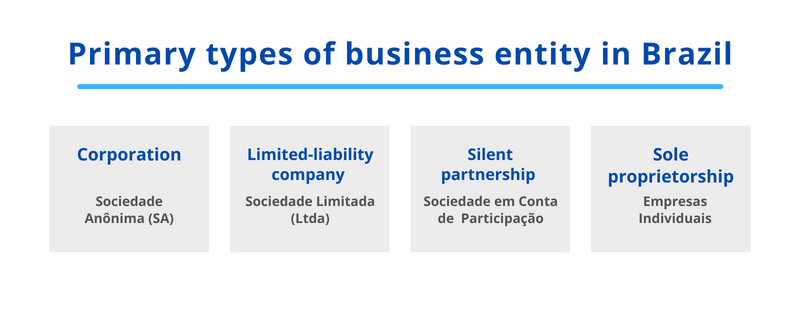
Capital gain on real estate sales: learn more about taxation, exemptions and statements
14/04/2023Law that extends Taxation on a Universal Basis until 2024 has been enacted
17/04/2023EXPERT OPINION
Setting up a business in Brazil: entity types, compliance and registration of foreign capital
Investors should plan their operations in Brazil mindful of the ways through which their businesses may be structured and incorporated
By Marluci Azevedo
In recent years, Brazil has put several measures in place to cater to foreign investors. This ranges from simplifying the procedures for setting up a business to adapting to the standards held by developed countries, such as making government services available through digital means.
Nevertheless, Brazil is still a rather unique environment, and you should count on local support to successfully plan your entry into the country. Before setting up a business here, a series of decisions must be made and you should anticipate what lies ahead so that your company remains in good standing.
Check out below a few important aspects regarding entity types, business formation and registration of capital in the country.
Types of business entity in Brazil
One of the first aspects to be dealt with concerns corporate planning. At this early stage, one should be mindful of the business goals of the company, the rights and responsibilities of its partners, its subscribed capital stock, among other legal, accounting, and tax-related issues. That's why it is important to count on specialized support to find a solution that is suitable to the business reality.
In Brazil, legal entities can be classified into several types. Learn more about the main ones below:

Corporation (‘Sociedade Anônima’ – S.A.)
- Preferred by large-sized companies.
- It is formed by filing the articles of incorporation, and its capital is divided into shares.
- May go public by means of an Initial Public Offering - IPO, through which a company’s shares are sold on the stock exchange.
- The term of office of executives and board members cannot exceed three years, after which a new election should be held (in which members may be reelected).
- Its legal aspects are more complex when compared to other entity types.
Limited-liability company (‘Sociedade Limitada’ -Ltda)
- It is formed by filing the articles of organization, whereby the units of ownership held by one or more of its members are outlined.
- The liability of each partner is restricted to their membership interest, but they are all jointly liable for subscribing to the company’s capital.
- Legal entities are allowed to be members, making it possible to add capital contributions with reduced bureaucracy.
- Managers can hold on to their position for an indefinite amount of time.
Silent partnership (‘Sociedade em conta de participação’)
- All operations concerning the partnership’s business purpose are carried out solely by the general partner (called “ostensive partner”), under his own name, with said partner being held responsible for all liabilities before third parties. In turn, the remaining members (called “silent partners”) will have a stake in the company’s results.
- The partnership’s constitution is only enforceable among its partners. Even if its articles of association are filed with any registry, this will not confer corporate personhood to the company.
- This entity type is often used to reduce bureaucracy when setting up a company that will only perform operations affecting its own partners.
Sole proprietorship (‘Empresa individual’)
- It encompasses the following business types: Sole microentrepreneur (MEI), Small Businesses (EPP) and Microenterprises (ME).
- Does not consist of partners, only one owner.
- Enjoys specific benefits, but also have a number of limitations.
- Benefits from lower taxes.
Tax treatment |
|
The tax treatment given to a company is closely tied to its entity type. Starting operations under the most appropriate tax regime is vital for a business to become well-established in Brazil. To this end, it is important that an analysis be carried out by experts, who should assess the most suitable tax treatment based on the company's business segment and size, corporate structure and estimated profit, among other aspects.
Read more: |
Business registration in Brazil
To be granted permission to operate in Brazil, a company must go through a series of registrations and enrollments with government authorities, and must also obtain certain permits and licenses.
Registration and compliance |
Determining the CNAE |
É necessário definir o segmento do negócio e It is necessary to determine the business segment and classify it according to the Brazilian National Classification of Business Activities (CNAE). When enrolling with the National Registry of Legal Entities (CNPJ), one should list all the CNAE codes pertaining to the company’s primary or secondary business activities. |
|
Filing with the registry of commerce |
This is the authority responsible for registering companies in Brazil. A series of documents should be filed, such as the articles of incorporation/organizaton, and a registration fee should also be paid. |
|
|
Enrollment with the CNPJ |
The Company must enroll with the National Registry of Legal Entitites (CNPJ) to obtain a Corporate ID Number. This number is required for several purposes, such as opening bank accounts and issuing invoices. |
|
|
Licensing |
Depending on the specifics of the business itself, it may be necessary to obtain health or environmental licensing, or similar permissions, as well as licenses issued by trade associations (e.g.: Regional Medical Council – CRM, Regional Engineering, Architecture and Agronomy Council, etc – Crea, etc.). |
|
|
Other |
The company must also carry out registrations before the Social Security Authorities (INSS and FGTS) and with state and local authorities, obtain a business license and a Fire Department operational permit, and fulfill other requirements specific to its business activity. |
Registration of foreign investment
Foreign investments must be registered with the Central Bank of Brazil. This registration is mandatory for both individuals and legal entities that are not resident in the country.
All foreign direct investors, whether they be individuals or companies, must be registered with the National Registry of Individual Taxpayers (CPF) or with the National Registry of Legal Entities (CNPJ), accordingly.
However, there are a few exceptions and limitations in place depending on the sector in which the investment is made.
Foreign ownership is prohibited in the following activities:
- activities involving nuclear energy;
- health care (except in cases prescribed by law);
- postal and telegraph services;
- aerospace industry (launching and positioning of satellites, vehicles, aircrafts or the commercialization of said items, but the prohibition does not extend to their manufacture or negotiation).
Foreign ownership is restricted in the following activities:
- acquisition of farmland and of lands located along national borders;
- financial institutions;
- exploitation of public air services;
- ownership and administration of newspapers, radio stations, television channels, magazines and other publications;
- mining sector.
Strategic partnership from the earliest stages of business formation
Domingues e Pinho Contadores is a specialist in assisting foreign investors run their businesses in Brazil, providing planning, setting-up and compliance support to them.
Thanks to its cross-functional team and its partnership with law firms, DPC has an integrated overview of the processes and offers all-round solutions for the good standing of companies. Take your first steps with the support of our experts: dpc@dpc.com.br.

Author: Marluci Azevedo, partner at Domingues e Pinho Contadores.
How DPC may help your company?
Domingues e Pinho Contadores has specialized team ready to assist your company.
Contact us by the e-mail dpc@dpc.com.br
See more
Sign up for our Newsletter:
Are you interested?
Please contact us, so we can understand your demand and offer the best solution for you and your company.

Rio de Janeiro
Av. Rio Branco 311, 4º e 10º andar - Centro
CEP 20040-903 | Tel: +55 (21) 3231-3700
São Paulo
Rua do Paraíso 45, 4º andar - Paraíso
CEP 04103-000 | Tel: +55 (11) 3330-3330
Macaé
Rua Teixeira de Gouveia 989, sala 302 - Centro
CEP 27910-110 | Tel: +55 (22) 2773-3318



